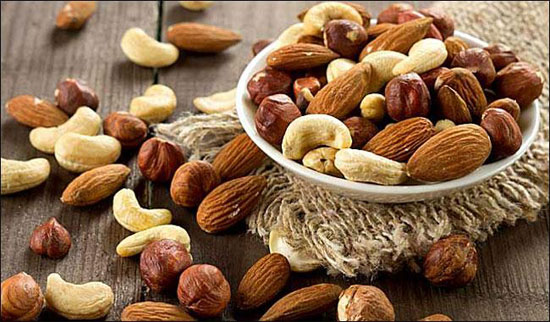Eating a handful of nuts every day may be the best way to keep the weight off
Nuts may be calorie-dense, but they’re a healthy snack that contain fiber and nutrients. According to a study, eating a serving of nuts daily can help with weight loss.

The preliminary study, which was presented at the American Heart Association’s Scientific Sessions 2018, was conducted by researchers from the Harvard T.H. Chan School of Public Health (HSPH). The California Walnut Commission partially funded the study.
Nuts support weight loss and maintenance
In the study, the researchers set out to determine whether consuming nuts can affect long-term weight change. Dr. Xiaoran Liu, a research associate in the nutrition department of HSPH and the study’s first author, noted that most people who are trying to manage their weight often avoid calorie-dense foods like nuts.
During the course of the study, the researchers observed the effect of adding nuts to participants’ diets or trading nuts for other snacks, such as chips, desserts, fries, processed meat, and red meat.
The results showed that both adding and swapping nuts for other kinds of foods offered benefits. Adding a daily serving (around 28 g, or a small handful) was associated with reduced risk of weight gain or becoming obese. Meanwhile, substituting one type of food with a daily serving of nuts was linked to reduced weight gain.
For the study, analysis, Liu et al. worked with three separate study cohorts:
• 25,394 men (Health Professionals Follow-up Study)
• 53,541 women (Nurses’ Health Study)
• 47,255 women (Nurses’ Health Study II) None of the participants had a chronic disease and were not obese when the study began.
To determine the amount of nuts that the volunteers consumed, the scientists used food-frequency questionnaires every four years over the course of each established study group, which went on for an average of 26 years. The findings revealed that walnuts were especially effective.
The study participants were mostly Caucasian, and Liu notes that the results would be consistent across other populations since the link between nut consumption and other health outcomes is “pretty consistent” across populations in the U.S. and Europe.
Registered Dietitian Lori Chong from the Ohio State University Wexner Medical Center wasn’t involved in the current study, but she noted that the fiber content of nuts could be responsible for these findings. Chong said that since fiber is crucial for weight control, it might also be linked to a blood sugar response to nuts, unlike other snacks.
Chong explained that anything that spikes blood sugar will spike insulin, which promotes fat storage. Snacking on something that doesn’t cause blood sugar spike doesn’t require insulin.
Weight gain vs. weight management
Liu warned that when you enter adulthood, you may have a gradual weight gain of at least one pound a year on average. In 15 years, those extra pounds could be linked to health risks like cancer and Type 2 diabetes.
Chong noted that if you really want to manage your weight, preventing weight gain is more effective than trying to lose weight after. She advised that the best way to do this is by avoiding processed foods, following a balanced diet, and exercising regularly.
The findings revealed that calories aren’t the only marker of a food’s nutritional impact. Nuts are full of polyunsaturated and monounsaturated fats, both of which are heart-healthy, especially when they’re replacing unhealthy saturated and trans fat found in processed snacks.
Additionally, nuts contain fiber that boosts satiety and fullness. Fiber is also good for gut microbial diversity. According to a 2015 article in the International Journal of Molecular Sciences, gut bacteria could have a role in immunity, weight, and risk for various diseases like diabetes, heart disease, and inflammatory bowel diseases.
In addition, nuts contain three macronutrients (carbohydrates, fat, and protein). Nuts also have calcium, phytonutrients, and other minerals that can boost your overall well-being.
When buying nuts, avoid products roasted in oil, with salt, or nuts with added sweeteners. Chong advised that nuts with added spices should also be avoided since they may include chemical flavoring.
Choose some raw or dry-roasted nuts, such as:
• Almonds
• Brazil nuts
• Cashews
• Pistachios
• Walnuts
If you don’t want to eat plain, raw nuts, roast them at home then add herbs or spices for a boost of flavor. You can also add a tablespoon of nuts to cottage cheese, oatmeal, salad, or yogurt.
Eat nuts the same way you would consume a portion-controlled snack if you want to properly manage your weight.
yogaesoteric
May 8, 2019
Also available in:
 Français
Français
